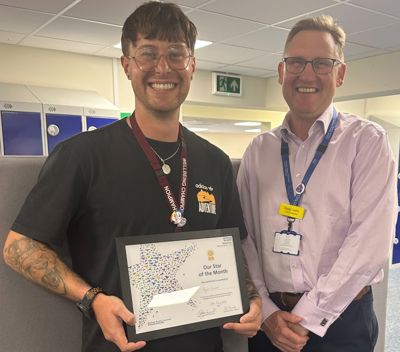“I don’t let this stop me from living” – Ryan’s story
30/03/2025
Whilst training in the forces, Ryan started to experience bipolar disorder and psychosis. For World Bipolar Day, he explores his symptoms, recovery goals, Rethink Mental Illness’ peer groups and the mental health work he has done over the years.
My journey started off at the age of 25 when I decided to follow my dream of joining the forces. The start of my training was going extremely well - three days in the corporals stated I could win trophies through basic training, and due to my determination to stand out and succeed, I really pushed myself. I was also made a room leader in our unit and tried helping the younger recruits.
But from the start of my training, I was getting a maximum of three hours of sleep a night, which ended up getting me elated. This carried on for 10 days, until I was eventually admitted to an inpatient ward.
I was admitted due to my manic presentation and was later told I was experiencing psychosis. I was telling friends and family of how I was going to cure poverty and make the world a better place, because of winning money from what I thought was a betting loophole. I was very grandiose and had many delusions.
-
Just because I’ve experienced psychosis, anxiety, depression and bipolar disorder, it doesn’t mean this dictates my life
I was discharged after 28 days and sent back home. Later, my appeal to rejoin the forces was denied. This was a hard pill to swallow and was something that played on my mind for years. I felt a massive loss of direction, failure and hopelessness. But I went back into work shortly after being at home.
Work was going ok, but I was slowly neglecting my sleep, ignoring warning signs and not taking my medication. The lack of sleep and stress slowly built up, which my family and friends could see, but I couldn’t due to my lack of awareness and insight. It ended up in a second admission, which was traumatic for my family as they saw how it occurred and it scared them. I was not hostile to them, but I was risky in my behaviour and nearly ended up spending £4000 on a hotel.
My second admission is where the penny finally dropped. I realised I needed to take on advice from professionals; that I didn’t want to be in a cycle where it affected myself and the people around me. My second episode is where I was diagnosed with bipolar disorder type two.
-
I didn’t want to be in a cycle where it affected myself and the people around me
I left hospital after 28 days and returned to work. I was engaging with support groups, medication; getting help from family, friends and my keyworker, who was crucial in my recovery. After a while at work, my keyworker notified me of a peer support worker role available in the team I was under. Long story short, I secured the job.
I now help people daily who have had similar experiences of psychosis. This job has taught me a lot about myself and my experiences, and has given me the tools to turn my life around. I have done presentations at the Royal College of Psychiatrists, work with Exeter university and spread awareness where possible to help try and reduce stigma around mental health.
In 2023, I was signed off work with depression for a couple months. I used that time for a lot of reflecting. This was a tough time for me, but I turned my focus to fitness which transformed my mental state to the best it has been.
One of my goals was to get back to the mental state that I had when joining the forces, and I’m now at a point where I’ve surpassed that. I am a promoter of physical health helping mental health, have completed a tough obstacle course, a half marathon Spartan race, and will be doing my first Hyrox, a fitness competition, in 2025.
-
I also want to give a shout out to Rethink Mental Illness for their peer groups that my service users and myself have used
There were many things that helped me get to the best version of myself: learning from failure, getting outside of my comfort zone, avoiding comparing myself to others; managing stress and sleep, surrounding myself with positive people, doing things I love. Socialising, keeping to a routine, speaking to others about your problems and feelings, and recognising triggers, were all things that also helped the service users I worked with.
I also want to give a shout out to Rethink Mental Illness for their peer groups that my service users and myself have used. Its hugely important for people to not be isolated and to be around others who have maybe experienced the same.
Just because I’ve experienced psychosis, anxiety, depression and bipolar disorder, it doesn’t mean this dictates my life. I don’t let this stop me from living, achieving my goals, going to festivals, solo travelling and leading a happy life. I want to show others you can always turn things around and it is never too late to ask for help.



